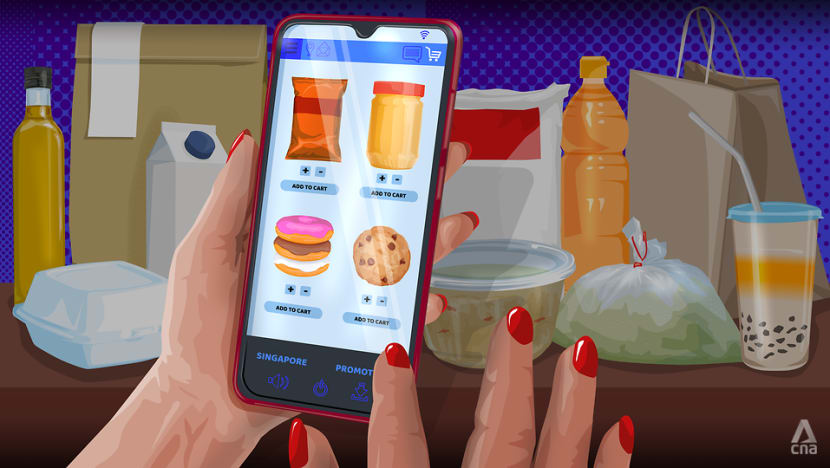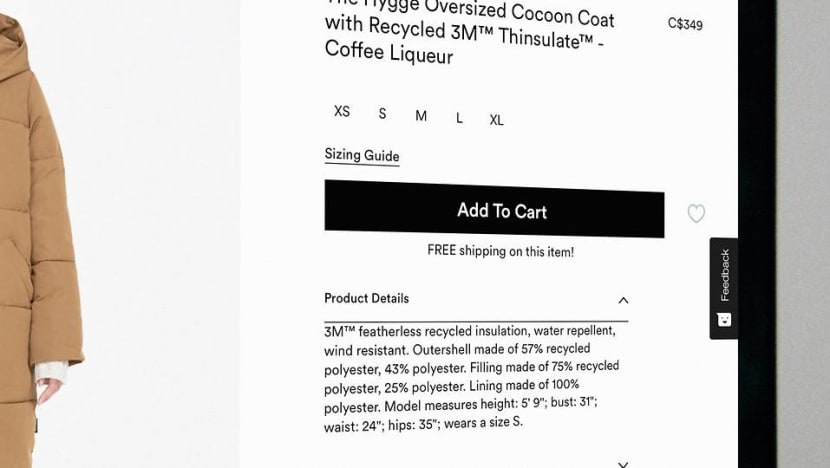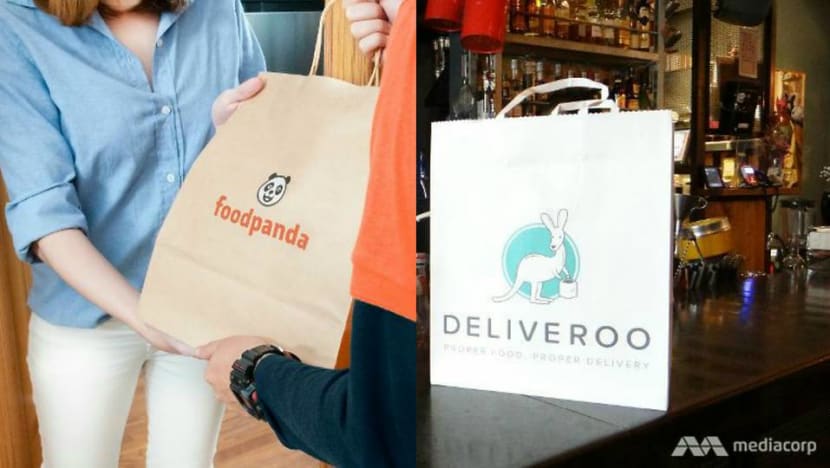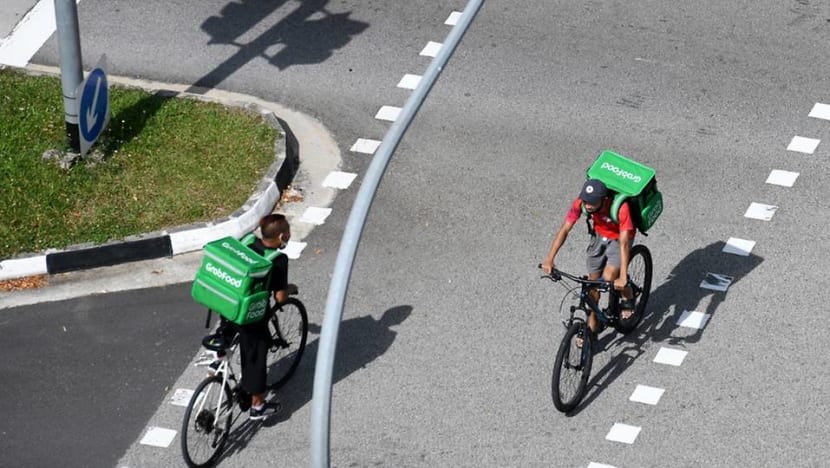commentary Commentary
Commentary: We are becoming a 'dabao nation' – why does it feel like a bad thing?
With COVID-19, our eating habits have changed – where we used to converge for meals, we now order in. This new world betrays a generational divide, says Crispina Robert.

That shift towards food delivery has created a 'dabao divide'. (Graphic: Rafa Estrada)
SINGAPORE: Pre-COVID-19, I was what a young person would call a “noob” when it came to ordering things online. I did not have a single Lazada, Shopee or Redmart account and I didn’t order a meal on an app either.
My general aversion to embracing online shopping was based on a most boomer-esque observation: I found the whole process rather tedious.
If I were looking for one item, I had to scroll through reams of pages because there are so many options. And then I had to wait for someone to deliver it so I had to be home to receive it.
Plus, I will be the first to admit to countless forgotten passwords and have had so many pages hang on me, I simply gave up.
It just didn’t seem worth the trouble to get a bunch of grapes and a loaf of bread online when it was just easier to hop on the bus, get into a mall, and pick up what I wanted.
When it came to food, I was even more circumspect. I didn’t understand why I had to pay S$8 for a bowl of fish soup via a delivery platform when I could get it for S$5 if I simply walked 500m to the hawker centre.
My views and behaviour were in direct contrast to my sons - ultra millennials who are capable of not moving an inch from their rooms and have things delivered to them constantly.
They know all the hacks, have loyalty points and can place any order in under a minute (it legitimately takes me many more painful minutes).
My doorbell rings on a regular basis where a friendly person delivers all manner of things - burritos, guitar picks, shoes, headphones - I wouldn’t be surprised if a little hamster shows up at my door.

All that lazy and classist consumerism vexed me endlessly but clearly, this is quite common among young people. In our last episode of Heart of the Matter podcast. The Soup Spoon founder Andrew Chan spoke of how his young staff order food.
“In my corporate office, I have a hawker centre right downstairs and I will see some of my younger staff ordering food delivery for lunch and I am like, 'but the hawker centre is just downstairs and the food is probably at half the price!'” he says, adding that this is the new reality and a sign of things to come.
But now, thanks to COVID-19, everyone has joined the big online bandwagon in quite a rush.
READ: Commentary: How China ensured no one went hungry during coronavirus lockdown
READ: Commentary: If we can share or hitch rides, why not food delivery?
THE DELIVERY ECO-SYSTEM DUEL
A spirited conversation between two experienced players in the food industry has laid bare a new truth to this movement of ordering online.
Everyone ordering via apps and on websites are now part of this eco-system that creates and sustains hundreds of thousands of livelihoods and has become, whether we like it or not, a central part of a future economy.
Our other guest, Mr Jakob Angele, CEO of Foodpanda APAC, confronted the bad press delivery platforms have been getting for charging up to 30 per cent of commissions from F&B players.

His point is worth bearing in mind: That delivery platforms are part of the critical food economy and they too have bottom lines to worry about and employees to feed.
“The margins on food delivery are extremely challenging too (especially on small purchases). We need to run a business which is economically viable too. Expectations need to be realistic. It is a very challenging situation for all of us and everyone needs to move together – the owners, the government, landlords and delivery platforms,’’ he says.
He makes it clear that he sees delivery platforms as part of the engine that’s keeping the food economy moving – by keeping restaurants open, by supporting riders with a stable income and watching their own bottom lines too. It is in their interest to help restaurants – and they have been working hard to do just that, he says.
Listen: How many stars will you give Singapore's F&B industry this COVID-19 season?
Read: More of your favourite restaurants are now offering takeaways and deliveries
On the matter of commissions, Mr Angele was clear: Reducing them means cutting into rider earnings (and delivery platform margins) – so the trade-offs are not insignificant.
On the other side of this food fight are restaurant owners. For years, they have been operating using a simple formula - make good meals, have people come in to their restaurants and “dabao” directly if they wanted to. Discounting hefty rental fees, manpower and other costs, the best of them managed to get by rather nicely.
COVID-19 hit these guys like a hurricane - when your customers cannot come to you, you have to go to them. Unless you rolled up your sleeves and re-oriented your manpower with your own vehicles, you had to rely on delivery platforms.
Like so many bits and pieces of our lives, once the dust settles, it will be time to review some of these practices and hopefully, the duel between the delivery businesses and restaurant owners can be less painful, enabling both to earn decent wages and keep Singapore fed.
This discussion also has to take into account landlords and their rates too as both men rightly point out.

THE FUTURE OF FOOD
For a few weeks now, I had been missing my favourite Hokkien prawn noodles and happened to see a post online about ordering directly from the hawker.
I texted the number to ask: “I just need two packets. Can I come and pick it up?” The reply was curt: “We deliver, please stay at home.”
So I ordered two servings which came up to S$10. My delivery fee: S$10. The frugal boomer in me sighed but the millennial emerged to say, hey, you are supporting local. You are keeping a business alive. You are helping to ensure the wheels of the food industry keep turning. Plus, it was utterly delicious.
Could this be our food future? I am not sure I like it very much. I would rather sit at a harshly lit coffeeshop or a busy hawker centre, see families chatting and old uncles drinking beer and complaining about life – that to me is soaking in the Saturday vibe.
I put it down to my experiences growing up – food was a social activity and going out was half the fun.
But in what I see as the great “dabao divide” I am not sure my millennial sons will live that way, not all the time anyway. It might be entirely possible they will skip all the tediousness that getting out of the house entails.
And instead, with a few clicks on their phone, have their food delivered to them. Afterwards, they will “meet” their pals through the computer, chatting, eating, listening to music and soaking up a different kind of Saturday vibe.
COVID-19 might leave a vastly different food economy in its wake and young people will embrace it heartily, like a good plate of Hokkien prawn noodles.
LISTEN: COVID-19 and the outlook for Singapore’s residential property market in 2020 and beyond
BOOKMARK THIS: Our comprehensive coverage of the coronavirus outbreak and its developments
Download our app or subscribe to our Telegram channel for the latest updates on the COVID-19 outbreak: https://cna.asia/telegram
Crispina Robert is an editor at CNA Digital News where she oversees podcasts.















